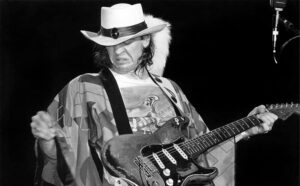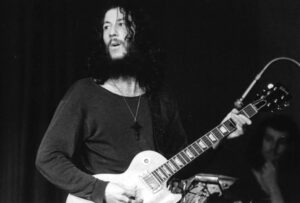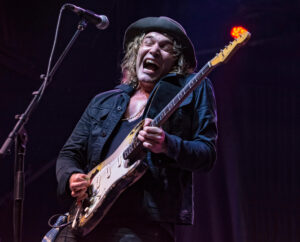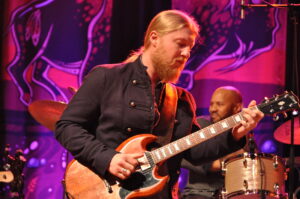If you are really serious about your guitar tone, it is worth investing in a boutique amp.
Boutique amps are hand built and hardwired, often just by one person or a small team. They are made using very high quality components and are constructed in a way that is not possible using mass manufacturing techniques.
As a result, they usually sound amazing. They have a depth of tone and a dynamic range that you just don’t get with mass produced amplifiers.
This quality comes at a cost, so all of the amps featured in this article are in a higher price bracket. As such, they aren’t suitable if you are on a more restricted budget.
If you are searching for a special amp though, and are happy to make an investment – opting for a boutique amp will work wonders for your tone.
Here is my shortlist of the top boutique amp brands that I think are perfect for the blues:
Matchless
Matchless are widely recognised as the brand that kick started the boutique amp craze of the 1990s. When the company started in the late 1980s, the guitar industry was moving away from the tube technology used in vintage voiced amplifiers.
Matchless founder Mark Sampson felt this came at the cost of tone. So he and partners Rick Perotta, Steve Goodale and Chris Perrotta set about hunting down old valves and the highest quality components they could find.
This gave birth to the Matchless DC-30 – an amp used by players like Billy Gibbons, Joe Perry and Jimmie Vaughan, amongst countless others. It remains the company’s most popular amp.
Unlike many of the brands listed here, Matchless amps come packed with a lot of tonal shaping options. The DC-30 features 2 channels, a ‘cut’ switch, 6 position tone switch and a master volume.
So if you enjoy tonal tweaking, then opting for a Matchless could be an amazing choice.
This is also true whether you are playing at home or gigging. The master volume controls on Matchless amps allow you to find the tone you want, and then raise or lower the overall volume of the amp.
This really helps if you do a lot of playing at home and have to keep the volume down.
As a final added bonus, you can order the amps bespoke for you. You can change the colour of the cabinet, front panel and grill cloth.
You can also see what your amp looks like before ordering by using their helpful (and very enjoyable!) ‘Amp Visualizer’ tool.
To see the full Matchless range and spend time building your ideal combo! head over to the Matchless site.
Honey Bee
I discovered Honey Bee amps a couple of months ago, after watching a rig rundown with Dan Patlanksy. Patlanksy is an amazing player and one of my favourite modern blues guitarists.
In addition to his brilliant playing, Patlansky has one of the best vintage blues tones that I have ever heard.
It is rich, warm and breaks up perfectly into a smooth overdriven sound. Just listen to songs like Only An Ocean (Reprise), Judge A Man, and Never Long Enough.
To achieve these beautiful tones, Patlansky uses boutique amp brand Honey Bee.
Designed and built in Hungary, Honey Bee are quickly gaining a reputation for producing amazing amps at very reasonable prices.
These amps are developed to recreate the tones of players like Stevie Ray Vaughan, Philip Sayce and John Mayer.
They have a lot of headroom, break up beautifully and take pedals very well. If that is the sound that you are after – then a Honey Bee amp would be an amazing option.
They capture that tone better than any other amp that I have heard.
The company offers 2 different models – the Honey Bee Head and the Belief Head. Each of these comes in various different sizes, ranging from 22w to 100w.
So you can pick the amp for you, depending on how much headroom you are looking for. You can also order the amps in different colours, and there are 95 to choose from!
To see the range and order an amp (they don’t stock products in any stores) – just head to the Honey Bee site here.
Milkman Sound
Founded in 2011 in California, Milkman Sound originally made amps for pedal steel guitarists.
Owner Tim Marcus – a pedal steel player himself – was looking for an amp with lots of headroom and beautiful clean tones. He struggled to find a suitable boutique amp on the market, and so decided to build one.
His amps became popular amongst pedal steel players (as well as John Mayer!) and he quickly expanded his catalogue to include smaller combos.
All of the Milkman amps have beautiful clean tones and a large dynamic range. They also all respond very well to pedals. As for headroom – it depends on which amp you opt for.
Amps like the 20W Creamer have a lot of headroom, whereas the smaller Half Pint and One Watt Plus will start to break up at lower volumes.
Almost all of the Milkman range have reverb and tremolo built in, and many of the amps also have power scaling options. This means you can get a high quality tone at a much lower volume.
If you are looking for a vintage voiced amp with beautiful cleans that you can play at home, a Milkman amp would be a great addition to your rig.
To see the full Milkman range, just head over to their website here.
Rift
Rift amps were founded in the UK in 2013, when owner Chris Fantana started building amps for close friends and family.
Word began to spread, and 6 years on Rift have become well known – particularly in the UK – for creating beautiful sounding boutique amps.
Unlike a lot of the other brands listed here, not all Rift amps are American voiced, Fender style amps. Whilst Rift do offer these, they also have a number of models that replicate the Marshall Plexi amps of the early 1960s.
So if you like the sounds of early British blues players like Eric Clapton, a Rift amp like the Plexi 18 could be a brilliant option.
Rift don’t yet ship to the US, but they make a particularly good choice if you are based in the UK or Europe.
This is because you don’t have to pay the shipping or import taxes that you do when buying a boutique amp from America. So they offer really great value for money.
All of the amps are made bespoke and you can tailor them to your preferences. You can alter the type of preamp used, the colour of the cabinet, and even the colour of the LED!
Finally, if you want to try to build your own amp – Fantana runs day and weekend courses. You can learn how to build a 53E Deluxe Tweed amp, which you take home with you at the end of the day.
For more information on the amps and the courses offered, head over to the Rift website here.
Tone King
Of all of the boutique amp brands listed here, Tone King is one of the more established. They produce beautiful American voiced amplifiers that replicate the tones of valve amps from the 1950s and 1960s.
One of the key features of the Tone King range is that each amp has an attenuator built into it. This makes them perfect for home use.
You can get a beautiful vintage tone without having to play very loud and the quality of the attenuation is brilliant. It preserves all of your tone, right up to the point where the amp is almost as quiet as an unplugged guitar.
Because of this option to attenuate, most of the Tone King Range is higher wattage. This means you can use the amps for gigging in larger venues and also for playing at home.
Tonally, the amps are also very versatile. They have beautiful cleans and produce a vintage, American style tone.
Unlike some of the other brands listed here though, they also have two channels – rhythm and lead.
So if you’re looking for an amp that will give you both a clean and overdriven tone, try some of Tone King amps and see how you get on!
For more detailed product information and to see the full Tone King range, head over to their website.
Dr Z
Founded in the early 1990s, Dr Z amps have become renowned for their versatility and affordability within the boutique space.
They produce beautiful vintage style tones that are perfect for the blues and are also brilliant for home use.
Many of their most popular models – like the Carmen Ghia and the Maz 18 come in at a relatively modest 18 watts.
So you can get beautiful tones at a level that won’t disturb your neighbours. Yet despite the slightly lower wattage, the amps still have plenty of headroom and also take pedals very well.
Even before you add pedals into the mix though, you’ll find that you can get a lot of different tones from the amp. This is in part because of the ‘cut’ knob (which I believe was heavily inspired by the Matchless DC-30!) that is featured on many of the Dr Z amps.
Dial this up and the amp will begin to break up into a slightly harsher, more modern sound. Scale it back and the amp will be warmer and deliver a more vintage sounding tone.
Beyond this, Dr Z amps are all about simplicity. Many of the models – like the Carmen Ghia – feature nothing more than a volume and tone control.
The idea is that you treat your guitar and the amp as one unit, refining the controls on each to find the perfect tone that you want.
So if you want a high quality tone and favour simplicity, a Dr Z amp could be a brilliant addition to your rig.
To see the full Dr Z range, head over to their website here.
Well there we have it – 6 boutique amp brands that are perfect for the blues. If you have any thoughts, questions or additions you’d like to add, post a comment.
Likewise, if you’re currently searching for a boutique amp and want advice, just send me an email on aidan@happybluesman.com and I’d love to help!
Images
Andertons, Honey Bee Amps, Pourles Musicians, Andertons, Electric Mojo Guitars, Sweet Water, Dr Z Amps
References
Youtube, Gear Fan Page, Youtube, Wikipedia, Youtube, Wikipedia
Links
Many of the links embedded in this article are affiliate links. As such, if you buy one of the pieces of gear I recommend, or an item from the same store after clicking one of these links, I will earn a small commission.
I never recommend pieces of gear that I wouldn’t use myself, and I include these affiliate links to ensure that I can keep this content free. If you have any questions, please feel free to reach out to me on aidan@happybluesman.com.





Responses
I really appreciate you mentioning that the Honey Bee amp is gaining reputation and reasonably priced. I bought an electric guitar in college and never got around to learning how to play. I’m considering getting an amp and maybe taking some lessons to finally make use of my guitar.
Thanks very much for the comment James. Yes you should absolutely go for it! It’s never too late to start learning, and playing the guitar is just so much fun and so rewarding. Let me know how you get on and if you ever have any questions or want some advice, send me an email whenever on aidan@happybluesman.com 🙂
Dan Patlansky only started using Honey Bee fairly recently (2 or 3 years). His main amp prior to that was a Dr Z EZG 50 for about a decade.
Thanks very much for sharing Schalk, I really appreciate it. I was aware that Patlansky had played DR Z amps, but I didn’t know which specific amp he had played, nor that he had used it for that length of time. Great to know, thank you! 😁
I really think Vintage Sound Amps should stand on this list too!! Rick Hayes makes some of the finest amps I have played so far… worth a look imo…
Thank you so much for the comment and the suggestion Jonathan – Vintage Sound Amps are new to me but I’ll definitely check them out. Thanks for sharing! 😁